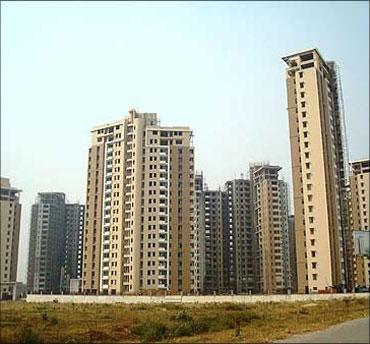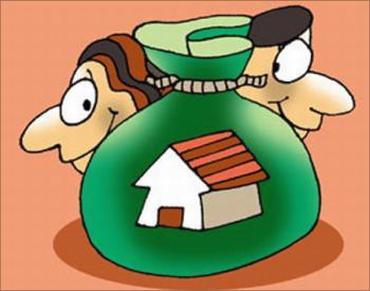Photographs: Rediff Archives Ramya ramachandran, Investmentyogi
Buying a home could be one of the biggest investments in a person's lifetime. Whether it is an under-construction home from a builder or an already constructed second-hand home, it pays to exercise caution in every aspect.
In the second of this three-part series on buying a home, Investment Yogi clarifies the two most important aspects: documentation and the various costs you would incur.
Also read:
Part I: Make home-buying a pleasant experience
Typical procedures when buying a home
1) Booking advance
The first and foremost payment to be made to the builder is the booking advance (up to 10 per cent of the property value). A receipt duly acknowledging the payment and an allotment letter is given to you. As the booking advance is generally non-refundable, be completely sure of the deal.
2) The sale agreement
This is the first agreement you would sign with the builder and would include the following:
- Booking amount
- Terms of construction
- Carpet area, built up area and the super built up area
- Cost of car park if any, and the various other amenities such as club house, gymnasium, etc., as promised by the builder
Final amount due from you, including all charges such as VAT, service tax, charges for amenities and car park. The costs incurred at registration will not be mentioned in the sale agreement
Ensure your agreement has everything that your builder has promised, such as, fittings, tiling, wood work, doors, windows etc. Many builders orally commit, but may finally not fulfil their promises.
3) The sale deed registration
The sale deed is the document which finally entails you as the owner of the property. It is signed only when the house is ready and you have paid your final settlement. The deed is registered with the sub registrar of the area to include your name in the local municipal records. A stamp duty as mandated by the government would have to be paid. At the time of registration, costs of sinking fund, maintenance deposit etc., are to be paid to the builder.
4) Possession of property
Possession is technically permissible only after the occupancy certificate (OC) is issued by the municipal authorities. The OC is issued once the architect submits the completion certificate (CC), duly certifying that the building is completed as per the sanctioned plan.
Many builders, however, provide provisional possession, for furnishing work, till the time the OC is received. The main documents provided at the time of possession are:
- Allotment letter
- The original agreement between the builder and you
- Occupancy certificate
- Possession certificate
- Allotted parking space
- Details of complete payment made with a 'no dues' certificate
For pre-existing properties do check the encumbrance certificate, ownership and legal heirs to the property and if all taxes for the property are paid.
1) Charges for amenities
Various costs included in the purchase
1) Charges for amenities
Irrespective of whether you use them, most builders collect upfront costs for amenities like party hall, gymnasium or club house. Some builders may even include cost of car park as a mandatory amenity.
2) Maintenance deposit
A maintenance deposit is a recurring cost covering municipal tax, water and common electricity charges, elevators, cleaners and security charges. Some developers charge the initial year maintenance charges upfront from the buyer at the time of registration.
3) Sinking fund
A sinking fund is a statutory obligation at the time of registration. It is to accumulate and keep sufficient funds for any future repairs, or structural alterations, to the building.
4) VAT and service tax
A service tax of 10.3 per cent on all under-construction property purchases from a builder or developer would have to be paid, as mandated by the government. Value added tax (VAT), is collected by builders on a certain percentage of the basic value of the home. This value varies from state to state.
5) Legal charges
To ensure all documents are in order, and for procedures involving legal title of the property, builders hire the services of a lawyer. Such legal charges are to be paid by the buyer at the time of registration of the property.
6) Stamp duty charges
Stamp duty is the tax that is paid on the documents, to bestow legal rights on them. These charges are mandated by the government, and they vary with each state.
A final word
The final cost of your home would be significantly higher than what is originally quoted by builders, on the basis of square feet rate. Hence, when finalising your home, it is vital to plan your finances to cater to these additional expenses.
The third and final part in this series next week would speak about home loans and the interest rate concepts buyers should be aware of.







Comment
article